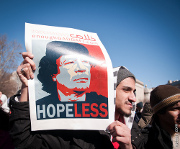
Libya (ODM/MNN) — On February 20, the first elections since the overthrow of Muammar Gaddaffi were
held in Misrata, Libya's third-largest city.
Reform is coming slower than the revolutionaries want, but the National Transitional Council says elections served as a model for
the June vote that will usher in a 200-member national assembly. The assembly
will name a new government and select a panel to write a constitution.
In the meantime,
there is a sense of freedom in Libya, which seems to be giving Christians new determination. An Open Doors worker, who wants to stay
anonymous, says, "The Christians in Libya are more open right now; they have
more courage to share about their faith. But of course the freedom is still
minimal."
At the beginning
of 2011, before the revolution, Open Doors estimates there were about 180,000
expatriate Christians living in the country and just 180 indigenous believers. The vast majority of the Libyans are Sunni
Muslim. However, as the dust settles post-revolution,
it seems that many expatriates left the country, significantly reducing the
numbers of believers.
The hostilities
some Christians are reporting stem from racism connected to politics. "Sub-Saharan Africans have said that they are
discriminated more openly. On the streets they hear people saying bad
words to dark-skinned people, for example. Before the revolution, this didn't
happen so strong and open", the Open Doors worker says. According to him, the
racism has partly to do with the fact that Gaddaffi used sub-Saharan Africans
to fight for him. As a result, members
of the churches for the sub-Saharan Africans are trying to survive in an increasingly
unfriendly environment.
Skepticism about
the politics isn't helping. "Politicians
are having a hard time at the moment. Nobody trusts them, and they can't do
anything right in the view of the majority of the people. Nobody has any
respect for them, and every decision is being criticized," the Open Doors worker
says. "This might be understandable after so many years of oppression, but for
the long run, this might be not a very constructive way of thinking for
rebuilding the country."
Pray for all the
Muslims that might be open to the Gospel, that they will meet Christians to
help them. Pray for the expat churches that exist in Libya that they, even
though it is forbidden, will find ways to reach out to locals.
